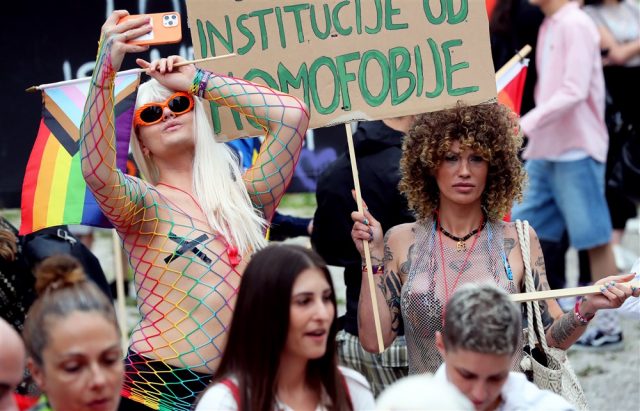
June Prides in Bosnia, North Macedonia, and Croatia were marked by violence, divisive legislation and societal divisions, while Albania faced privacy breaches and exam leaks. Hungary experienced DDoS attacks on independent news sites, and Romania saw arrests for sex trafficking. In Kosovo and Montenegro, misinformation and online insults reflected political hostility and divisions.
June Prides in Bosnia and Herzegovina, North Macedonia, and Croatia showcased the fight for LGBTIQ+ rights. However, violent attacks, controversial legislation and societal divisions marred these events. Hate crimes occurred in Bosnia and Herzegovina while North Macedonia faced opposition to proposed gender-related law changes. Croatia witnessed a massive turnout for the Zagreb Pride March, but also confronted a divisive marriage referendum.
In Albania, privacy breaches and exam leaks raised significant concerns regarding the unauthorized dissemination of intimate content and the compromise of high-stakes examination papers. In Hungary, independent news sites were targeted by DDoS attacks, posing threats to press freedom and raising questions about the vulnerabilities faced by media outlets. Arrests related to sex trafficking and exploitation in Romania brought attention to the need to combat these crimes and protect the most vulnerable members of society.
Finally, the digital realm in Kosovo and Montenegro has been marked by incidents of misinformation, reputational damage and online insults, highlighting political hostility and divisions in these countries.
Digital Fallout of June Prides: Unveiling Violations of Digital Rights
In June, Pride Parades were held, among others, in Bosnia and Herzegovina, North Macedonia, and Croatia, highlighting the struggle for LGBTIQ+ rights in these countries.In Bosnia, the Pride March in Sarajevo celebrated the advances in LGBTIQ+ rights. However, the event was marred by violent attacks on organizers and activists, which were classified as hate crimes. These incidents served as a reminder of the continued violations and discrimination faced by the LGBT community in the country.
In North Macedonia, the Pride Parade in Skopje aimed to raise awareness and promote acceptance of the LGBTIQ+ community. However, this event faced additional challenges due to controversial proposed gender-related law changes. The country’s Orthodox Church has called for a large protest against these proposed changes, arguing that they would open a “Pandora’s box”.
In Croatia, the Zagreb Pride March attracted over 10,000 participants who marched in support of the legal recognition of same-sex marriage and to show solidarity with the LGBTIQ+ community. However, the event took place amid public divisions over a proposed referendum seeking to define marriage as exclusively between heterosexual couples. While the march highlighted support for LGBTIQ+ rights, it also exposed the existence of societal divisions. Also, participants faced instances of online harassment and discrimination, revealing that violations occur both in physical spaces and in the digital realm.

LGBTIQ+ Misinformation and Hate Speech Unleashed in Croatia
In June, Croatia witnessed a series of digital rights violations that highlighted the prevalence of misinformation and hate speech targeting the LGBTIQ+ community. On June 6, a digitally altered photograph featuring Pope Francis holding an LGBTIQ+ flag began circulating on social media platforms. Fact-checking sources confirmed that the image was artificially generated using advanced AI technology. The timing of its emergence coincided with the observance of Pride Month, amplifying its impact and creating a buzz online. Investigations traced the origin of the manipulated photo back to a Twitter profile known for producing synthetic visuals. From there, it was shared by a Croatian social media user, leading to its widespread dissemination across online networks.
Several visual cues within the photograph indicated its synthetic origin, such as unfinished hand details and an ambiguous figure on the cross. Importantly, no official channels associated with the Catholic Church released or endorsed the image. Pope Francis himself has previously expressed support for the decriminalization of homosexuality and advocated for acceptance of the LGBTIQ+ community. Nevertheless, the image’s circulation fuelled discussions about the intersection of religion, digital manipulation and the LGBTIQ+ rights movement.
Continuing the troubling trend, on June 10, the organizers of the upcoming Zagreb Pride Parade issued a statement shedding light on the escalation of hate and transphobia in both public spaces and social media platforms. They described death threats, violence, personal insults, harassment, and belittlement directed towards members of the Organizing Committee as well as individuals and families associated with the LGBTIQ+ community. Alarmed by this, the organizers announced they would now cease to provide public statements to the media. This campaign of transphobic hate served as a reminder of the relevance and importance of this year’s Pride Parade. In the face of adversity, the organizers reiterated their commitment to championing the rights of transgender individuals with the slogan: “Together for Trans Rights”.
Another incident that exemplified digital rights violations in Croatia occurred on June 8. A Croatian social media user shared a false claim on Facebook alleging that the United Nations intended to replace the flags of all 193 member countries with LGBTIQ+ flags. This claim was based on a screenshot of an article from the VOZ portal. FactCheck.org, USA Today, Associated Press, and PolitiFact all confirmed that the claim was baseless. The article itself was subsequently edited to clarify that it was the Rockefeller Center, not the UN, that had displayed the LGBTIQ+ flags. The UN spokesperson emphasized that the UN does not alter the flags of member states, and the Rockefeller Center has no affiliation with the UN. Furthermore, the photograph used in the article was found to be dated from 2019 and readily available on Wikimedia Commons.
LGBTIQ+ Community Targeted in North Macedonia
Similarly, North Macedonia experienced a series of digital rights violations in June, with incidents of hate speech aimed at the LGBTIQ+ community. On June 24, during the Pride Parade in Skopje, a Twitter user from North Macedonia posted a hate speech-fueled tweet targeting the LGBTIQ+ community. This offensive message, shared on a day meant to celebrate diversity and equal rights, exemplified the existence of deep-rooted prejudice and discrimination within society.
Prior to this, on June 19, an LGBTIQ+ rights activist brought attention to a troubling incident that went viral. The activist shared a photograph revealing anti-LGBTIQ+ stickers plastered on a doorway in the town of Strumica, located in the south-eastern region of North Macedonia. The activist expressed disappointment, highlighting the contrast between Strumica’s previous reputation as a town of freedom and its current status as a place where hate speech thrives.
On June 15, a bookstore in Skopje, the capital of North Macedonia, fell victim to a massive hate speech campaign on its Facebook page. The campaign was orchestrated by an anti- LGBTIQ+ association called “Take Responsibility” in response to the bookstore’s promotion of an LGBTIQ+-themed book. The bookstore, known as Polica (The Shelf), had advertised a 50-per-cent discount on the autobiographical book of a young French gay author on June 1. In response, the association, boasting over 7,000 followers on its Facebook page, called upon its members on June 15 to shame the publishing company. A barrage of hateful comments, discrimination, and threats ensued from numerous Facebook users. The bookstore announced its intention to report the incident to the police.

Political Rhetoric and Digital Rights Violations in Pride Month, Bosnia
During Pride Month in Bosnia and Herzegovina, incidents of digital rights violations unfolded, revealing the challenges faced by the LGBTIQ+ community and exposing the prevalence of homophobia within society.
On June 24, Fadil Novalić, a member of the Federation entity’s House of Representatives, shared a photo of the cultural and religious manifestation known as the “513th days of Ajvatovica” on the same day as the Pride March. While initially appearing an innocent celebration of traditions, Novalić’s accompanying comments took a discriminatory turn. He expressed his satisfaction in witnessing the young predominantly embracing the natural traditions of their people, but went on to state that it was their obligation to protect children from “deviants” who imposed their own views. Novalić’s remarks revealed a stark violation of digital rights and the promotion of prejudice.
Simultaneously, also on June 24, Haris Zahiragić, a member of the Sarajevo Cantonal Assembly, expressed his disapproval of the Pride March through a tweet. Zahiragić posted a message stating: “I abhor what you do,” accompanied by an illustration depicting a man and a woman hiding under an umbrella to shield themselves from the rainbow emblem. This tweet and its accompanying imagery further perpetuated homophobic sentiment and intolerance. The comments section of Zahiragić’s post drew homophobic remarks and insults. These incidents during Pride Month serve as a reminder of the challenges faced by the LGBTIQ+ community in Bosnia and Herzegovina.

‘Serbia Against Violence’ Protest Triggers Concerns in Bosnia’s and Serbia’s Digital Spaces
The “Serbia Against Violence” protest in Belgrade, sparked by two mass shootings in May, saw large crowds rallying against President Aleksandar Vucic’s government, accusing it of nurturing a culture of violent impunity. Demanding changes in media and politics, the protesters seek to address the alleged promotion of violence and hatred. However, this protest also triggered a series of concerning digital rights violations, with online spaces becoming breeding grounds for targeted attacks and privacy breaches, highlighting the challenges faced by those exercising their freedom of expression in Serbia.
A first incident occurred in Bosnia. Targeted for his participation in the protests in Belgrade, Bosnian actor Feđa Štukan found himself at the receiving end of a verbal attack. On June 17, 2023, on Instagram, Serbian singer Jelena directly addressed Zoran Kesić, a renowned Serbian comedian, TV presenter, talk-show host, and political commentator. Jelena questioned Kesić’s association with Štukan, sharing a picture of them together from the protests. In her Instagram story, she asked: “Are you in the middle of my city hugging and laughing with a man named Feđa Štukan, a murderer and Islamic extremist, who, by his own admission, ‘killed Chetniks’ during the war?” The incident was a distressing example of the repercussions faced by public figures who participate in protests and exercise their freedom of expression.
On June 10, in Serbia, a concerning incident took place involving Sandra Božić, Member of the Presidency of the ruling Serbian Progressive Party and Vice-President of Parliament, and the actor Milan Marić. The altercation occurred on Twitter, a day after Marić had spoken at the “Serbia Against Violence” protest. Božić accused Marić of holding “anti-Serbian” views. To support her claims, she shared a video in which Marić had read statements from victims and witnesses of the 1995 Srebrenica genocide during the trial of Radislav Krstić and Ratko Mladić before the Hague Tribunal. Despite previously facing criticism for sharing this video, Marić again attracted public attention due to his involvement in the protests.
Digital Privacy Breaches and Exam Leaks in Albania
In June, Albania witnessed a series of troubling violations, ranging from the unauthorized dissemination of intimate content to the leakage of high-stakes examination papers. They raised significant concerns about privacy, online harassment, and the misuse of sensitive information.
On June 16, an alarming event unfolded when several online portals and media organizations in Albania distributed a video depicting the Mayor of Kukësi engaged in an erotic act with a woman. The identities of both individuals involved were made public, further intensifying the violation. Crucially, the woman in question was not associated with the institution in any official capacity. This incident serves as a reminder of the potential consequences individuals may face when their intimate moments are exposed without their consent, raising questions about consent, privacy, and the responsible use of personal information.
Another incident occurred on June 17 when Albanian online media outlets published personal photos of the woman who had appeared in an erotic video alongside the Mayor. Her private photos were exposed to the public just one day after the video had leaked on various social networks. This breach of privacy underscores the need for stronger safeguards to protect individuals from such invasive acts.
Meanwhile, on June 13 and June 19, high school final exam theses were leaked on social networks shortly after the exams had started. The mathematics and economics exam papers became widely accessible within only 20 minutes. The first to publish the leaked theses was a student’s profile called “Studentët Denoncojnë” on Instagram. These incidents not only compromised the integrity of the examination process but also demonstrated the need for robust security measures to safeguard educational systems against unauthorized access and dissemination of confidential material.
On June 1, the English language exam thesis was leaked through social networks just 30 minutes after the start of the high school final exams.

DDoS Attacks and Pimping in Hungary and Romania
June witnessed a series of troubling incidents that unfolded in Hungary and Romania, shedding light on significant digital rights violations. These incidents, characterized by DDoS attacks, cyber attacks on educational platforms, and arrests related to sex trafficking and exploitation, raise concerns about the protection of privacy, the preservation of online freedom, and the need to establish robust safeguards in the digital realm.
In Hungary, a string of DDoS attacks targeted independent news sites, serving as a reminder of the vulnerabilities faced by media outlets. On June 10, the independent Mérce news site experienced a disruptive DDoS attack, temporarily rendering it inaccessible. The independent Telex news site fell victim to a similar attack, causing disruptions in its accessibility. The following day, the news site nyugat.hu of Szombathely faced a DDoS attack. Furthermore, the independent HVG news site endured a multi-day DDoS attack, hampering its ability to deliver timely news and analysis. Lastly, on June 12, the news site of ATV encountered yet another DDoS attack, raising questions about the motives behind these cyber assaults.
In Romania, digital rights violations were manifested in cyber attacks on educational platforms and arrests related to sex trafficking and exploitation. On June 3, the upcoming International English Language Olympiad website suffered from a cyber attack, leading to spelling errors and inaccessible sections, potentially undermining the credibility of the event. The owners of the website cited a targeted cyber assault, drawing attention to the need for enhanced cybersecurity measures to protect educational resources and ensure a fair academic environment.
Meanwhile, Romanian authorities made significant arrests in cases related to sex trafficking and exploitation. Influencer Vlad Obuzic, known as “Vlad Obu”, faced prosecution for alleged involvement in operating a studio for cam girls, disguising it as a front for sex trafficking. His arrest shed light on the harrowing experiences endured by the victims who were subjected to physical abuse, forced prostitution, and the production of explicit content. Also, arrests were made in connection with pimping an underage girl and a woman with a mental disability, highlighting the need to combat human trafficking and protect the vulnerable from exploitation.
Political Hostility and Divisions in Online Realm in Kosovo and Montenegro
In Kosovo and Montenegro, incidents of digital rights violations emerged, involving misinformation dissemination, reputational damage, and online insults.
In Kosovo, digital rights violations involved the spread of misinformation and the intent to damage reputations. On June 14, the Facebook page “Gazeta Rilindja”, with a following of 41,000, posted a picture of Kosovo Prime Minister Albin Kurti alongside an alleged quotation attributed to him. The quote claimed that Kurti stated: “Kosovo can live without Edi Rama, he showed to be a pro-Serb against Kosovo. I would have not imagined.” However, there is no record of Kurti making such a statement, and it appears to be a deliberate attempt to misrepresent his views. Similarly, on June 13, the Facebook page “Portali Alt” shared a picture of Albanian Prime Minister Edi Rama and Serbian President Alexandar Vucic shaking hands, with a description: “Serbia thanks Albania from its heart over their position on Kurti.” This post generated negative sentiments in the comments section, with users assuming the description to be true. However, no official statements confirming this gratitude from Serbia towards Albania have been made, indicating a clear case of a post intended to damage reputations. The same picture and description were also shared on another Facebook page called “Krejt Shqiptare”, which has a following of 37,000.
In Montenegro, digital rights violations involved online insults targeting public figures. On June 15, outgoing Justice Minister Marko Kovac was subjected to insults on Facebook. The insults were directed at Kovac after the portal Antena M shared his criticism of the Prosecution Council’s decision to reject a request from his ministry. One user referred to Kovac as a “perfidious Nazi”. Another called him “scum”. On June 17, the French ambassador in Montenegro, Christian Thimonier, faced insults on Twitter. In response to Thimonier’s comment about the formation of a new ruling majority in Montenegro, a Twitter user named Blue Wall referred to him as a “French fascist”.
Bosnia has been covered by Elma Selimovic, Aida Trepanić and Azem Kurtic, Albania by Nensi Bogdani, Romania by Adina Florea, Hungary by Ákos Keller-Alánt, North Macedonia by Bojan Stojkovski and Goce Trpkovski, Montenegro by Samir Kajosevic, Kosovo by Diedon Nixha, Croatia by Matej Augustin and Serbia by Bojan Perkov and Ninoslava Bogdanović of SHARE Foundation